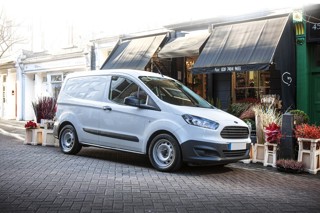Plans for a clean air zone (CAZ) in Bristol could leave 830,000 commercial vehicles facing charges in its first year of operation.
The air quality scheme, which would see all but the cleanest vans, trucks, taxis and buses paying a charge to enter the zone, also includes a ban on all privately-owned diesel vehicles entering the city centre between 7am and 3pm, seven days a week.
Non-compliant heavy goods vehicles (HGVs) and light commercial vehicles (LCVs) would have to pay a daily charge of £100 and £9, respectively.
HGVs that meet Euro VI emissions standards and Euro 6 (diesel) or Euro 4 (petrol) vans would be exempt.
The city is under a legal obligation to reduce air pollution by lowering nitrogen dioxide (NO2) levels to within legal limits as quickly as possible.
It was among 24 local authorities ordered to improve air quality by the Government in 2017.
Bristol City Council’s cabinet has now decided to forge ahead with the ‘hybrid’ plan, incorporating a so-called category ‘C’ CAZ, charging non-compliant HGVs, buses, coaches, taxis, private hire vehicles (PHVs) and light goods vehicles (LGVs), as well as the diesel city centre ban.
The CAZ will cover a wider area of the city, with both coming into force from March 2021.
The Government will have to approve the plan and introduce secondary legislation to allow the council to ban diesel vehicles.
A council report says that, “following conversations” with the Department for Transport (DfT) and Department for Environment and Rural Affairs (Defra), “we are confident this will be achieved”.
It would be the first local authority to implement such a combination of clean air measures and it will be asking the Government for £113 million to fund the scheme, substantially more than Leeds (£29m) and Birmingham (£38m) received for their respective CAZs.
Mayor of Bristol, Marvin Rees, said the plans would help the city reach “legal limits” of NO2, within the “shortest time” frame. Modelling suggests this will be by 2025.
Rees said: “For people who do not support the current proposal, including the small area diesel ban, you are left with having to implement a larger area charging zone that reaches compliance later.”
The city’s ruling Labour administration submitted its outline business case to the Joint Air Quality Unit following approval by its cabinet.
A full business case will now be developed, including a consultation on any exemptions, before submitting final plans to the Government in February 2020.
‘PUNITIVE’ CHARGES
The Road Haulage Association (RHA) is warning that charging commercial fleet operators to enter the city will put firms at risk.
It says the charging scheme will force firms, with trucks registered as late as 2013, to choose between prematurely replacing their fleets, paying the crippling charges or going out of business.
Chris Ashley, the RHA’s policy advocate for environment and regulation, dubbed Bristol’s plans as “punitive” and said a phased approach to CAZ charging, which focuses on the oldest, most polluting vehicles, would more likely improve air quality while safeguarding local businesses.
“We all want to breathe clean air, but hitting firms with punitive, pay-to-pollute charges isn’t a credible way to get us there,” he said.
“Given that it takes 12 large vans to carry the same load as a single 44-tonne lorry, it stands to reason that pricing trucks out of Bristol could spark an increase in congestion and poor air quality.”
He also slammed plans to impose a 24/7 lorry ban in key city streets as “impractical and inappropriate”.
Automatic number plate recognition (ANPR) cameras will be used to enforce the CAZ charging area and diesel ban. Penalty charge notices (PCNs) will be issued to drivers who choose not to pay the charge or ignore the ban.
The council said the level of the PCN has not been decided, but, for the purposes of modelling, the fine was assumed at £60 (if paid within 14 days) and £120 (after 14 days) for all contravention of CAZ charges.
Rees says the council is “acutely aware” of the need to protect the local economy and jobs, but this will be considered in the full business case ahead of the February 2020 submission deadline.
NON-COMPLIANT VANS
ALD Automotive has its main UK offices in the city. The vehicle leasing company, in conjunction with the University of the West of England (UWE), has conducted a study into how Bristol’s CAZ could affect fleets.
Matt Dale, head of consultancy for ALD, said: “Government and local authorities must accept that we need time to act, and we need the information to act upon.
“Fleets will not be able to change their vehicles overnight and will need confirmed details in order to make informed decisions.”
The ALD study looked at 10 months of data from customers’ vehicles fitted with ALD telematics to understand their movement in Bristol and the surrounding area.
It found that, dependent on the position of the Bristol CAZ boundary, almost half (49%) of all vehicles entering the zone would be non-compliant and would attract a charge if it was introduced today. For vans, the figure was more than 80%.
Both percentages will obviously fall due to natural vehicle replacement cycles over the 17 months to the proposed 2021 CAZ launch date.
“The findings of our study have huge implications for everyone,” added Dale, “not only financial but the administrative burden too.”
Critics have suggested an unintended consequence of the CAZ could result in neighbouring roads to the zone becoming more congested as vehicles try to avoid the area.
However, the council claims vehicles will be scattered over a larger area and it will not lead to a deterioration in air quality to illegal levels outside the zone.
Nigel Base, commercial vehicle manager at the Society of Motor Manufacturers and Traders (SMMT), said: “We want to see all cities, including Bristol, meet their targets and continue to invest in ever-more advanced technology to help improve our environment. The automotive industry is committed to a low carbon future and is investing massively to get there.”
However, he added: “We need a clear and consistent national approach to clean air zones that incentivises uptake of the latest, low emission vehicles.”
Motorists in the south-west are not just facing a CAZ in Bristol. Nearby cities have their own plans.
Bath’s proposed category ‘C’ CAZ will impose a charge on all non-compliant vehicles passing through it and is due to be introduced at the end of 2020.
The daily fees are expected to match those proposed by Bristol – £9 for a van and £100 for a HGV.






















Peter Taylor - 21/11/2019 15:25
So the diesel ban will apply to private motorists of even the latest diesels yet Bristol City Council are exempting older and dirtier taxis who they continue to licence, irrespective of age or mileage or Euro class.